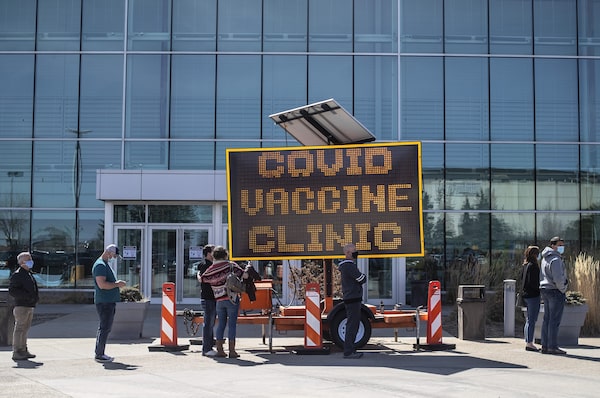
People line up outside an immunization clinic to get their COVID-19 vaccine in Edmonton, April 20, 2021.JASON FRANSON/The Canadian Press
A non-profit group in Edmonton has launched a mobile pop-up immunization clinic to serve people living in shelters and encampments across the city, making COVID-19 vaccines as accessible as possible.
The Boyle McCauley Health Centre, or BMHC, has vaccinated more than 750 people who are homeless in Edmonton. The homeless have been identified as a particularly vulnerable population for COVID-19, with outbreaks at shelters at various points during the pandemic. Alberta joined other provinces in giving people who live in shelters early priority to vaccines.
Throughout the pandemic, BMHC has been working with Alberta Health Services to provide isolation facilities for people who are homeless in Edmonton, and these mobile vaccine clinics are their next step.
Canada vaccine tracker: How many COVID-19 doses have been administered so far?
COVID-19 news: Updates and essential resources about the pandemic
“If we can bring [the vaccine] to them and break down the barriers to them accessing it, we’re all going to be much more successful at getting the entire population vaccinated,” said Tricia Smith, executive director of BMHC.
The clinic is built into a van and resembles a physician’s office, equipped with a screening room and an examination table, as well as a sectioned-off space to offer clients more privacy. After each appointment, the van is sanitized to follow COVID-19 public-health measures.
When the weather is more co-operative, Ms. Smith said the mobile clinic acts more as a space to carry supplies, offering vaccines outside of the van to increase efficiency and reduce time spent cleaning the van’s interior.
For second doses, BMHC is keeping records of people it has vaccinated and plans to repeat its mobile clinic strategy and pop-up vaccination sites to ensure people living in shelters and encampments are protected from the coronavirus.
The mobile clinics are in partnership with community outreach from the Bissell Centre and Boyle Street Community Services, which Ms. Smith said are essential partners. “We couldn’t do this alone.”
A report from the Edmonton-based Bissell Centre, another non-profit that focuses on housing and other social services, said people experiencing homelessness during the COVID-19 pandemic are more vulnerable because of “underlying health conditions, lack of access to COVID-19 information and personal protective equipment.”
The report noted studies showing higher infection and mortality rates among this population.
While homeless people were given priority access to vaccines, they continue to face barriers to getting their shots, both logistically and psychosocially. With reduced access to smartphones, the internet and transportation, along with some not having the proper identification documents required for other vaccine clinics, organizations across the province are adapting to serve this population better.
“They’re more concerned about where their next meal is going to come from and where they’re going to sleep tonight than they are about getting a vaccine,” Ms. Smith said.
Creating a safe space for people to get their shots, with familiar faces and increased accessibility, helps reduce barriers, she said.
Shannon MacDonald, an assistant professor at the University of Alberta specializing in immunization, said people who are homeless might not know where vaccine clinics are located and about changes to eligibility.
“They’re completely disenfranchised from that,” she said, and by removing these barriers and making vaccinations more accessible, it bridges the gap in medical care.
Dr. MacDonald also said this population faces psychosocial barriers, including mental illnesses and poor experiences with the health care system in the past.
Other organizations across Alberta offer targeted vaccine clinics for people experiencing homelessness, including the Aboriginal Friendship Centre of Calgary, or AFCC.
Krista White, spokesperson for AFCC, said the organization’s approach to vaccine clinics is “quite unique” as they provide cultural components, including smudging the area with sweetgrass and sage to reduce anxiety around vaccinations and to cleanse the “mind, body and spirit.”
Marginalized groups need to be prioritized, Ms. White said, “especially the homeless population.” Their clinic also serves Indigenous peoples and newcomers.
For people who are homeless, AFCC allows walk-in appointments with no registration necessary. While other folks receiving their vaccine at the centre line up in their cars, they made a specific area for people who are homeless to reduce barriers to access, which also benefits people with limited mobility, and they can bypass the line.
Ms. White said it’s important to “cross the finish line together” by getting as many people vaccinated as possible, guiding them through the process, increasing accessibility and answering any questions they may have along the way.
We have a weekly Western Canada newsletter written by our B.C. and Alberta bureau chiefs, providing a comprehensive package of the news you need to know about the region and its place in the issues facing Canada. Sign up today.